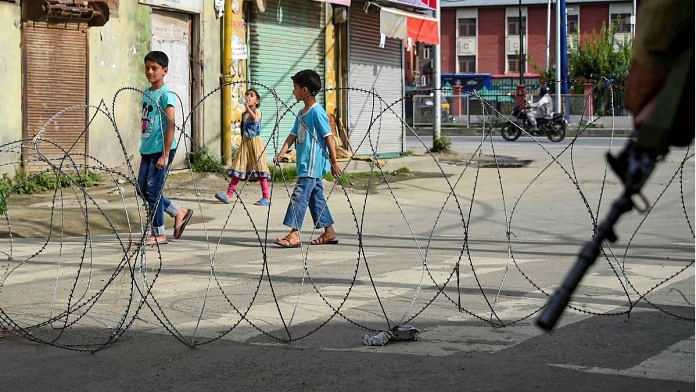Srinagar, New Delhi: Schools and colleges, among the worst affected by the lockdown to contain Covid-19, are now increasingly resorting to online classes to salvage their academic sessions. But that has proved a problem for educational institutions in Kashmir where an internet blackout was only recently lifted.
In the first week of March, the Jammu and Kashmir government lifted the seven-month long ban on the internet but restricted the speed to 2G, creating hurdles for those who might want to attend online classes.
The speed restriction has been extended through an order issued on 27 April, crushing the hopes of students and their parents that online classes could be possible in the Union Territory.
Many parents, students and teachers that ThePrint spoke to complained that it takes hours for them to upload files for online lectures and that Zoom calls and video calls are next to impossible. This is in stark contrast to other parts of the country where schools and colleges have been aided by platforms such as Google Classes, Zoom, Google Meet and Microsoft Team to conduct classes.
“How is it possible to hold online classes at 2G speeds. The speeds are extremely low and most of the time either the connection snaps or works at such slow speed that it is impossible for students to understand what is going on in the classes,” said Khursheed Ahmed, whose sons study in a private school in Srinagar.
Also read: Why Abdullahs, Mehbooba are silent on Article 370 and what it means for Kashmir politics
‘Even Google classes tough’
A teacher at a private school in Budgam said, “We teach our students through Google classes in which we need to upload videos, worksheets, audio clips and sometimes powerpoint presentations.
“Every night from 9 pm to 1am teachers are busy uploading files. Ideally, the files should not be larger than 15 MB as they will not get uploaded and students will have problems downloading them as well. Also, it is very rare that the files get uploaded in the first attempt.”
“Time is precious for any student and we do not intend to waste a student’s time but the government should realise this and help us with better connectivity,” he added.
Google classes are online classes that are recorded in the form of video or audio lectures, with PPTs, documents and other elements inserted in them.
“We have internet speed as low as 0.2 kbps,” said another teacher. “The highest we have seen is 75 kbps but it isn’t consistent and I teach lower primary classes, I can’t even imagine how higher classes are coping.”
Sharaf, a Class 10 student said, “Every morning is frustrating for me and my parents as I struggle with online classes and they help me resolve my issues. I always wonder about people who deny us the internet, how do their children study?”
Also read: Start evaluation process for board exam answer sheets, HRD minister tells states
AIR to now help with lessons
To deal with the issues, the Education Department of Kashmir is set to start classes through All India Radio (AIR). Teachers will read out lessons according to the curriculum, which will then be transmitted through radio.
In an earlier interaction with ThePrint, Human Resource Development (HRD) Minister Ramesh Pokhriyal Nihshank had also said that the government is trying to tie up with AIR to start transmitting lessons through radio to reach places where internet connectivity is an issue. While there has been no development on this at the national level, Kashmir might soon see classes through radio.
Meanwhile, the Ministry of Human Resource Development, which advised all schools to start their academic session through online mode from the first week of April has taken some initiatives to address the problem of no internet connectivity, like starting classes through Direct to Home services Tata Sky, Airtel and Dish TV.
The ministry has also asked teachers to call up parents and hand assignments for a week to students in lower classes, wherever there is no internet connectivity.
Alternate academic calendars that the government has released with the help of National Council for Educational Research and Training (NCERT) also suggest ways to deal with the internet connectivity issues. They include activities and challenges, in keeping with weekly themes taken from the syllabus.
Also read: UGC likely to give universities freedom to decide exam plan, but there may be no winter break




It’s impossible for rular areas to get access of broadband and fibers… So i request higher authorities of United Nations to look into this matter and we wanna relaxation over censorship on internet
I would say that Right to Education is a fundamental right enshrined in the Indian Consitution and being so every citizen has a right to access the same irrespective of what kind of living conditions under which he hails.
It is obvious that the BJP Government at the Centre , which¹ is governing the State through a Lt,Governor, is more afraid ot an educated Kashmiri than a terrorist ,that is why it has adopted the fig leaf of ” national security ” to deprive them of education. The educational activities in the State are at stand still since 5th of August last year.
National interest above all. Either way people who find faults now were instrumental closing educational institutions in support of terrorists. Many schools even bombed and destroyed and it is Indian security forces grace the schools rebuilt in same place!
Not everyone is rich in j nd k so cant afford broadband so everyone cant get it… I hope this pill would be able to swallow for some illiterate goons of lost world without brain
Criminal conspiracy to keep j&k students lagging behind their counterparts in other states.
So the state has no concept of broadband? The entire state runs on 4G? Hard pill to swallow.